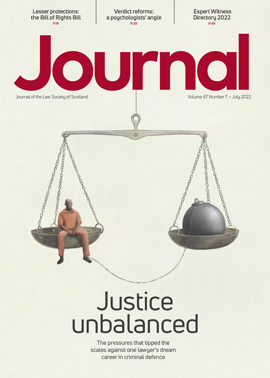Expert witness: case law update
While Part 35 of the English Civil Procedure Rules contains mandatory rules on duty and procedure that expert witnesses and their instructing parties in England & Wales must adhere to, there are currently no equivalent rules under Scottish law, and few rules of court that directly affect experts. Nevertheless, the compliance and conduct of an expert witness during a case held in Scotland can be critical to the outcome and/or the reliance placed on their evidence. Instructing parties are therefore advised to keep abreast of common law developments in this area, as well as ensuring that any experts they instruct have received up-to-date and relevant training on their role and conduct.
There have been several recent cases commenting on the role and conduct of expert witnesses. Below are a handful of the most relevant.
Expert’s overriding duty
The position relating to an expert’s duty was historically unclear until Ury Estate Ltd [2019] CSOH 36, which confirmed that it is the expert’s duty to help the court on matters within their expertise, and this duty overrides any obligation to the person who instructed them, or the paying party. As such, expert opinion must be objective, unbiased and uninfluenced by the pressures of litigation; experts must not assume the role of an advocate and their evidence must be confined to their expertise.
Set out basis factors
T v W [2022] CSOH 44 is a personal injury case where a primary school teacher sought damages from her former employer for psychiatric injuries suffered during her employment. The pursuer objected to the evidence of the defender’s expert witness, claiming that he had not followed Kennedy v Cordia (Services) [2016] SC (UKSC) 59 in stating “the facts or assumption on which his opinion is based”, and “the relevant factual evidence so provided”. The motion was refused by Lord Summers, who found that the witness had complied with his duty under Kennedy v Cordia, as he had acknowledged that he had been supplied with precognitions, and the facts disclosed in his report were based on these precognitions.
Relevant expertise
Gemmell v Scottish Ministers [2022] SC GLW 16 is a common law negligence case where the pursuer alleged that specific duties were owed to him by the defenders in the exercise of reasonable care. While Sheriff Reid found the pursuer’s expert witness to be “a thoroughly engaging and impressive witness”, he felt that large sections of her report were entirely irrelevant, and he attached little weight to her evidence as he felt that “she did not have the relevant expertise to offer reliable opinion evidence on the key issues in this case”.
Admissible and reliable?
Martin v Hughes [2021] CSOH 109 concerns a claim for unfair prejudice under the Companies Act 2006 by a minority shareholder in a limited company that provides accountancy services. The respondents claimed that the petitioner’s expert failed to act as an independent expert witness to the standards set out in Kennedy v Cordia, on the basis that “His evidence as to the choice of valuation methodology… was, in essence and as he himself accepted, merely his say-so”, and “Moreover, he had no contemporary, real world valuation experience.” This was rejected by Lord Clark on the basis that the expert ‘’obviously offered opinion evidence, but it was not, as suggested, ‘merely his say-so’. Rather than being unsubstantiated ipse dixit, it was based upon quite standard features of the EBITDA approach”. The judge went on to say that the expert “did have… appropriate experience”, and that he explained, “with reasons, why the EBITDA approach for valuation… was to be preferred”.
Disclosure of prior connections
Joint Liquidators of RFC 2012 plc, Noters [2021] CSOH 99 concerned an application by the joint liquidators of a football company under the Insolvency Act 1986. Lord Tyre addressed certain issues regarding the respondents’ expert, stating that although he did not hold the expert’s evidence as inadmissible (on the basis of Kennedy v Cordia), it must be treated with caution owing to the fact that his connections with one of the owners of the football company were not disclosed in his expert report. The explanation given by senior counsel failed “to have proper regard to the duty incumbent upon [the expert] himself to disclose prior connections”.
Summary
Expert witnesses are assumed to be aware of and understand the terms of their appointment, including their duty to the court and the extent and limits of their role. As expert witness skills and disciplines are different to those of an expert’s day job, the above cases emphasise the value of regular and up-to-date professional training to an expert witness to ensure they are kept abreast of all the key developments in common law regarding the scope of their duty and its application. Instructing solicitors are advised to bear this in mind when appointing and working with expert witnesses.
Perspectives
Features
Briefings
- Civil court: Issues on appeal
- Licensing: Minimum pricing – a genuine impact?
- Insolvency: How to admit joint creditor claims
- Tax: windfall and plastic packaging taxes raise stakes
- Immigration: Asylum system overhauled
- Scottish Solicitors' Discipline Tribunal: July 2022
- In-house: In with the stonework
- Property: Living with the Register of Overseas Entities
In practice
- OPG update: July 2022
- Public policy highlights: July 2022
- Gear up for the Scottish Legal Walks
- Disabled solicitor support group proposed
- Risk: Cybercrime – the hybrid worker prey
- Ask Ash: Piling it on
- TRS: time for a trusts trawl
- Know people, know business
- High street and hybrid
- Appreciation: Ian Leslie Shaw Balfour
- The Expert Witness Directory 2022
- Expert witness: case law update







